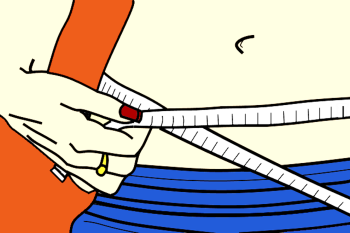Struggling To Lose Weight? Read This

If you’ve tried and failed to lose weight, you are not alone.
When we try to lose weight, our body fights back.
Assuming that you know the first and most important rule for weight loss — calorie deficit — below are more things you can do to aid weight loss:
1. Eat protein-rich food
Protein is an important nutrient for losing weight because it takes more calories to digest than other foods and also helps the body build fat-burning lean muscle tissue.
Eating smaller portions of balanced meals more often (4-5 times a day) — including at least 10g of protein per serving will give you the energy and the feeling of fullness, which reduces your cravings.
Good sources of protein include eggs, lean meat, plain unsweetened yogurt, chickpeas, and protein powder.
2. Consider fat-burning foods and supplements
Fat-burning ingredients like protein, spicy peppers, caffeine, and green tea have been proven to improve metabolism.
Caffeine is a stimulant that increases your heart rate and metabolism.
Green tea extract is rich in antioxidants that help to boost your metabolism.
Capsaicin is an ingredient found in chili peppers that helps to increase your body’s temperature, leading to increased fat burning.
Not many people know, but balancing blood sugar and metabolism are the keys to successful weight loss.
You can consider dietary supplements like Phenq.com that aids metabolism, but speak to your doctor before taking them. Phenq customers report that their food cravings have diminished, their mood is more balanced, and energy levels increased – all of which have helped with weight loss.
3. Drink more water
Drinking plenty of water helps to keep your metabolism working properly, flushes out toxins, and keeps you feeling full longer.
Aim to drink at least 8 glasses of water per day, and more if you’re exercising frequently or in a hot climate.
Try incorporating some healthy zero-calorie beverages into your diet (such as unsweetened tea or coffee). It’s important to avoid sugary drinks (e.g. soda and sports drinks) because:
- They can cause cravings
- They’re high in calories
- They can lead to weight gain
4. Eat whole foods
Whole foods are foods that don’t come in packaging. Whole foods are fresh fruit, vegetable, whole grains, and lean meat.
Eating whole foods helps to regulate your appetite because they are more filling than processed foods.
Processed foods are tempting because they’re tasty and easy to make.
Sadly they’re often high in unhealthy ingredients like saturated fats, added sugars, and sodium.
They can also be low in important nutrients like fiber, protein, and vitamins.
5. Exercise regularly
Exercise can help you burn calories, build muscle and stay in shape.
It also has numerous other health benefits like improving mood, increasing energy levels, and reducing your risk of developing chronic diseases like heart disease and diabetes.
If you’re overweight, a moderate but consistent exercise program will beat an intense one any day.
Walking 30 minutes every day will benefit you more than an intense 90-minute routine.
Adding some strength/weight lifting training to your workout routine will help you increase muscle. Bigger muscle mass will speed up your metabolism, because muscles burn more calories than fat eve at rest.
Quicker metabolism makes weight loss easier.
Lifting weights can also help prevent metabolic slowdown and ensure that your body stays toned and muscular as you age.
You don’t have to go to the gym or buy fancy equipment to get a good workout.
There are plenty of exercises you can do at home or in a local park
Here are some practical tips:
- Start by doing some simple cardio exercises like walking, jogging, or cycling.
- If you want to get more intense, try HIIT (high-intensity interval training) workouts or add in some strength training with bodyweight exercises or dumbbells.
- Don’t forget to warm up and cool down for a few minutes before and after your workout.
- Aim to achieve around 30 minutes of exercise most days of each week.
6. Get enough sleep each night
Research has shown that people who get less than 6 hours of sleep per night are more likely to be overweight or obese.
Getting enough sleep helps to regulate the hormones that control appetite – so you’re less likely to feel hungry and eat more during the day.
Here are some helpful suggestions for better sleep:
- Aim for 7-8 hours of sleep every night
- Establish a regular sleep schedule and stick to it as much as possible (even during the weekends)
- Avoid caffeine and alcohol before bed
- Create a relaxing evening timetable including winding down for 30 minutes before sleep
- Avoid the blue light from TVs, phones, tablets, computers, and laptops one hour before bedtime. This light can upset your circadian sleep pattern.
- Keep your bedroom dark, quiet, and cool.
Finally,
There are 2 main pillars to weight loss:
Food & exercise.
The key to sticking to a fitness regime long-term, aim at consistency over perfection.
Be sure to enjoy the workouts & the new meals you make (so you increase your chance of consistency).



